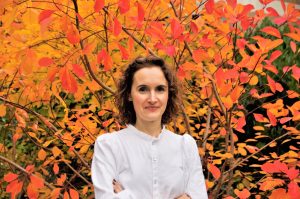May 16, 2023, by lzzre
Public Geographies of Brexit
Professor Sarah Hall
 Since 2019, I’ve been supported by the ESRC through a Senior Fellowship with UK in a Changing Europe to research the economic geographies of Brexit. This work intensified in Autumn 2022 with the further support of a period of research leave from the School of Geography.
Since 2019, I’ve been supported by the ESRC through a Senior Fellowship with UK in a Changing Europe to research the economic geographies of Brexit. This work intensified in Autumn 2022 with the further support of a period of research leave from the School of Geography.
The main focus of my research is on the implications of the trade deal agreed between the UK and the EU after Brexit for the UK services sector. This deal was formalised through the Trade and Cooperation Agreement (TCA) agreed on 30 December 2020. However, despite services making up around 80% of the UK’s economy, relatively less attention has been paid to this sector compared with manufacturing in research that explores the UK’s post Brexit settlement.
My research seeks to highlight this oversight. This is important because whilst the EU achieved many of its strategic objectives in the trade negotiations for manufacturing where its comparative advantage lies, the UK did not achieve the same for its strategically important services sector.
Working alongside Dr Martin Heneghan, now in the School of Sociology and Social Policy, our research suggests that the worst-case scenarios for UK services has not come to pass. For example, the UK has seen far fewer financial services jobs leave as a result of Brexit than was expected in worst case scenarios. However, our research suggests that these headline figures may be hiding regional variations with job losses disproportionately impacting regions beyond London and the South East. This is important because cities such as Birmingham have developed local economic development plans that place great emphasis on attracted services, and financial services in particular. We are also interested in where new jobs are being created across Europe, particularly in locations beyond the major international financial centres such as in Poland and Portugal. This research has been reported in the Financial Times here.
I’ve also been tracking the significant regulatory changes happening in financial services and exploring what this means for regulation more generally in the UK.
A central part of my research involves sharing research findings with groups outside the University. I call this the development of public geographies.
During my research leave, I was fortunate to be able to share my research with EU representatives in London as well as a range of other policy makers interested in the changing nature of the UK economy post Brexit and Covid. I also served as an external advisor to research being undertaken by other organisations. Here I was particularly interested in the growing body of work that is developing trying to better understand the persistent nature of regional inequality in the UK. This is one of the most pressing issues facing the UK economy in the future and is the focus of my current work.
No comments yet, fill out a comment to be the first

Leave a Reply